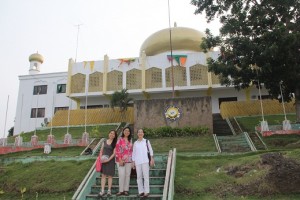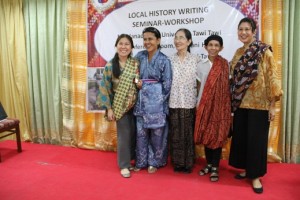The more important occasion on the 2012 trip to Tawi-Tawi was the Local History Writing Seminar-Workshop on 28-29 September 2012 held at the Sabdani Bulante Conference Room at the Mindanao State University-Tawi-Tawi.

The seminar-workshop was the brainchild of Prof. Filemon Romero, PhD. Aware of the importance of reviving and promoting local history writing, various agencies supported the project: the NCCA, the MSU-TCTO, the provincial government of Tawi-Tawi, the local government of Bongao, among others.
Some 100 participants from the academe, local government, government agencies (NCIP and NCMF), civil society, cultural groups, and members of the Sultanate came to contribute to the field of local history writing in Tawi-Tawi.
Ligaya Amilbangsa delivered her paper: A Case Study: Method of Instruction for the Preservation and Conservation of the Pangalay Dance Tradition of the Sulu Archipelago. She began her paper with words of wisdom from a seasoned cultural conservationist: “To disregard dance tradition is to lose history. Because other than the precious movement vocabulary and music, dance is costumes, accessories, properties, and context within its place of origin. The method of instruction should be easy to comprehend, simple yet precise, consistent, comprehensive, flexible and realistic. Sensitivity is a key to learning and gaining mastery of the pangalay movement vocabulary in such a method.” Included in the demonstration are pangalay variants that reconcile tradition and transformation, thus illustrating that the distinct character of pangalay (also known as igal among the Sama and paunjalay among the Yakan) can be simultaneously preserved and conserved.

Nannette Matilac presented the prospects documenting local history in the digital age: “And if electricity and television changed life and culture in Tawi-tawi over a period of three decades since the early 1980s, digital technology is now changing life in the province in unknown ways. This change is exponential, with surprising consequences that are still immeasurable. The affordability and accessibility of cellular phones have changed the life in the islands, enabling people from hard-to-reach communities to communicate 24/7. Since mobile phones are also handy multi-media instruments that can function as telephone, radio, voice recorder, organizer and camera —these instruments have been used by ordinary citizens to record anything and everything from mundane activities to important events.”
The seminar-workshop was a big success and plans for implementing the recommendations of the workshop are underway.
Photos courtesy of Cynch Paz.
Leave a Reply